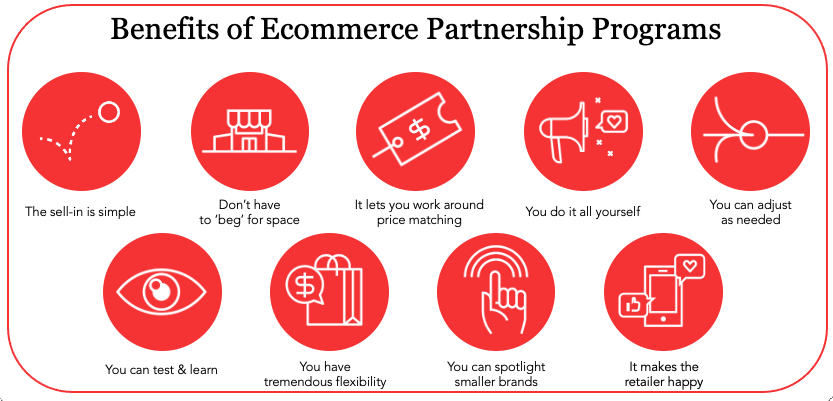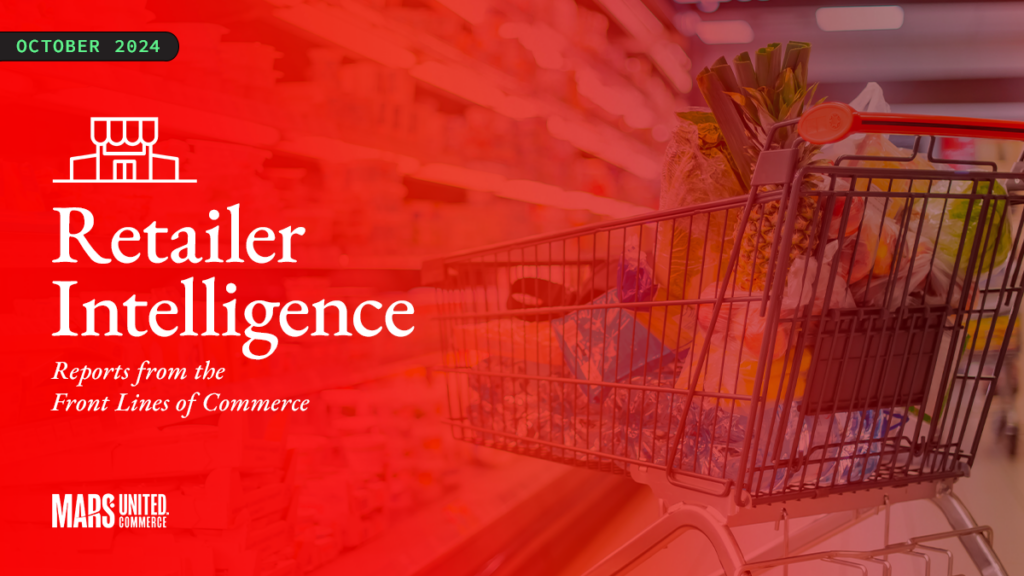By Melissa Wightman, The Mars Agency
The following article is the first in a three-part series examining “Game-Changing Ecommerce Partnerships.” The next two articles look at “Picking the Ideal Marketing Partner” and “Activating Your Ecommerce Partnership Program.”
The nature of ecommerce in general, and Amazon in particular, gives brands a wealth of opportunities to collaborate on partnership programs that will deliver solutions, value, convenience — or all three — for online shoppers.
In general, strategic marketing collaborations at retail have long provided numerous benefits for partnering brands (not to mention retailers and shoppers), as outlined in the graphic below. But the ecommerce ecosystem can be even more advantageous for effective brand partnerships because it eliminates many of the obstacles that have made programs difficult to execute in the traditional store environment.

What is it about ecommerce that makes it more conducive to beneficial partnership programs than traditional brick-and-mortar? Here are nine factors that should inspire brands to consider adding more partnerships to their digital commerce plans.
1. The sell-in is simple. Brands have far more control of their destiny online, starting with the fact that there is little to no program sell-in required. Many of us have experienced the process at brick and mortar over the years, where sell-in can take six, 12 — even 18 months lead time. The benefit of running your own business on Amazon is that you are really in control.
2. You don’t have to beg for space. Similarly, you don’t need to negotiate for physical space like you do in the store, which often involves getting multiple category managers to agree on how much real estate you’ll receive and where it will live based on how much sales velocity they think the program will have in their respective categories.
3. It lets you work around price matching. How do you remain competitive outside of price? We obviously know that’s a key component to selling on Amazon, but it eats away at your margin. Partnership programs can mitigate some of that price matching by providing a unique point of differentiation that can’t be so easily compared.
4. You do it all yourself. You are really in the driver’s seat for defining the program: what tools, what activations, what it will look like. You — along with your partner, of course, control all aspects of the campaign.
5. You can adjust as needed. One of my favorite things about running ecommerce programs is the ability to optimize, shift or pause quickly. If you’ve gained some early learning, you can modify the creative; if you’re facing an inventory challenge, you can pause or switch to another item. You have that flexibility through ecommerce.

6. You can test & learn. Ecommerce gives you the opportunity to conduct test & learns to gain immediate insights. I’ve worked with several brands that have used Amazon simply as a learning platform to validate some of their longer-term strategies. You can immediately see if the concept works in this environment and determine if there is a bigger opportunity moving forward.
7. You have tremendous flexibility. You can adjust plans based on inventory levels, item relevancy, or even seasonality. Since all the elements are literally at your fingertips (rather than already placed in stores), you can work with your partner to find ways of gaining more eyeballs by changing the way the program is brought to life.
8. You can spotlight smaller brands. Another great opportunity that you have with ecommerce programs is the ability to showcase brands with low household penetration and/or limited funding. One of the huge benefits of partnership programming in general is the fact that you can double your brand’s exposure by doubling the investment reaching new audience segments.
9. It makes the retailer happy. Finally, partnership programs are a great way to help the retailer differentiate itself from the competition, potentially grow sales in two categories and add some excitement to the shopping experience.
The same holds true for partnership programs at brick and mortar, of course. But as we’ve discussed in this article, it can be a whole lot easier to do it in ecommerce.
Now that we’ve established the benefits of ecommerce partnership programs, we’ll outline strategies for picking the right partner and offer tips on effective activation in future articles.
____________

About the Author
Melissa Wightman is VP-Ecommerce at The Mars Agency. An industry veteran with over 25 years of shopper marketing experience, she has worked closely with multiple CPG clients in the food and healthcare industries.
Over the last 9 years, Wightman has helped build the agency’s growing ecommerce practice, and now works with her team of content, creative and media experts to deliver innovative solutions that drive growth for clients.



